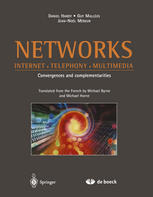

Most ebook files are in PDF format, so you can easily read them using various software such as Foxit Reader or directly on the Google Chrome browser.
Some ebook files are released by publishers in other formats such as .awz, .mobi, .epub, .fb2, etc. You may need to install specific software to read these formats on mobile/PC, such as Calibre.
Please read the tutorial at this link: https://ebookbell.com/faq
We offer FREE conversion to the popular formats you request; however, this may take some time. Therefore, right after payment, please email us, and we will try to provide the service as quickly as possible.
For some exceptional file formats or broken links (if any), please refrain from opening any disputes. Instead, email us first, and we will try to assist within a maximum of 6 hours.
EbookBell Team

5.0
40 reviewsRevolution, transformation, upheaval and promise! Yesterday, the technologies of com munication were accessible only to experts; today, they are a subject of constant discussion in the media. New services are advertised on a daily basis, and the potential, realized or not, of these technologies is a constant source of comment and discussion. But beyond the media frenzy, things really are developing with increasing speed, driven by the power of the Internet. The network has built up an ongoing relationship between research centres, development teams and marketing teams, allowing a constructive collaboration between technologies. The network has become the catalyst for its own evolution. The arrival of IP and GSM has given rise to new corporate giants, like Cisco Systems and Nokia. Operators, witnessing the diversification of their main sources of revenue, have been forced to merge or split. Entirely new actors from various horizons are counting on their ability to act as operators without a network to their name. Traditional equipment manufacturers have had to rethink their product lines in view of these new foundations. Likewise, governments have understood the need to create a body of laws that promote the harmonious and rapid development of networks to offer alternatives for operators and service providers. These often complex regulations act both as constraint and opportunity for operators and give direction to the actions of actors across the board.